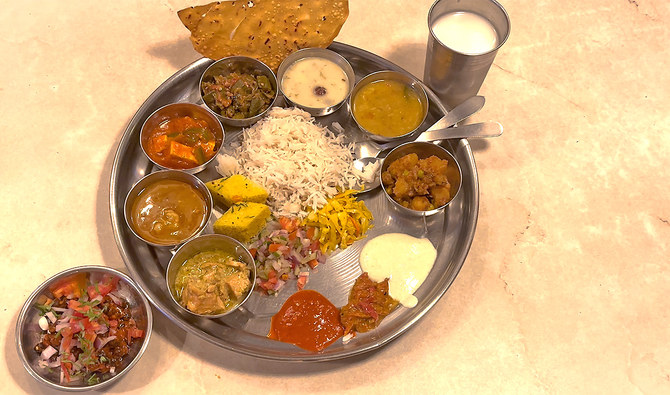KARACHI: Though Karachi is considered Pakistan’s culinary hub, and all types of foods and cuisines from around the world can be found at its thousands of restaurants and street stalls, it was not easy until a few years ago to find a concept central to dietary traditions in neighboring India: the thali.
Eleven years ago, the Pakistani port city saw the opening of Rajdhani Delights and with it the introduction of the thali platter, perhaps best described as a form of Indian tapas, or a variety of dishes served together in small portions. A thali is a large platter accompanied by small round bowls called katoris which are filled with different types of usually vegetable curries and lentils, as well as sauces, curds and condiments. Sometimes, the thali comes with built-in compartments for the different dishes, much like a bento box.
Few would have expected a vegetarian restaurant like Rajdhani Delights to thrive in meat-obsessed Karachi, but the eatery has been serving happy customers for a little over a decade in the city’s upscale Clifton area.
Upon entering the restaurant, one is welcomed by Jerome Earnest, the manager, and led to a table where a staff member appears in a vibrant Rajasthani outfit of a turban and angarkha robe and presents a golden pot in which to wash one’s hands.
A gleaming silver thali follows soon after, offering a colorful array of dishes like vegetable curries and stir fries made of potatoes, okra and cauliflower, as well as different types of lentils, phulka and puri breads, boiled rice, a variety of chutneys, salad, papri and dhokla. There is only one meat option of chicken on the menu.
“When someone comes here to eat ... they get a variety of dishes ... and especially the service, where people get to wash their hands and are presented food in a thali, that really attracts people,” Earnest the manager told Arab News.
Most people throng to Rajdhani Delights for the authentic flavor of its Gujarati thali, which comes from the state of Gujarat in Western India and includes several fried snacks, flatbreads, a variety of vegetable preparations cooked in ghee, as well as sweets.
Forty-year-old Farhan Rasheed, who runs an IT firm, said he had heard from elders in his family, many of whom migrated from India, about the country’s rich thali tradition.
“Now that we have the thali right in front of us [in Karachi], it feels even better,” he said as he sampled a dhokla, a savoury sponge dish made with a fermented batter that is steamed to a cake-like consistency. “It contains so many flavors.”
“You feel royal, which is the most important thing,” Rasheed added with a smile.
Much like Rasheed, who belongs to the Indian-origin Memon community, an elderly customer, a migrant from India who only identified herself as Mrs. Zaidi, also praised the restaurant’s “unique serving style” and its ability to generate a “sense of belonging.”
“We really appreciate that when we came, they washed our hands, we find that very nice,” she said. “Our food and culture remain the same [in India and Pakistan].”
“VARIETY OF OPTIONS”
The concept of serving an assortment of dishes on a platter has also inspired other eateries in Karachi.
Thali Inn, located on Boat Basin, opened in 2020 and initially focused on Indian vegetarian thalis before adding in Pakistani, Afghan and Middle Eastern options.
In India, too, thalis are not necessarily only vegetarian.
In the coastal regions of India, one can find variations of fish and seafood thalis. Kolhapur, a city in the state of Maharashtra in Western India, is famous for its various spicy mutton thali preparations and flavorful broths.
“Our thali now features more barbecue items,” Waseem Rehman, the manager at Thali Inn, told Arab News. “We offer vegetable thali but we have Arabic mandi thali and Afghan thali as well.”
Another outlet, 52 Thali Restaurant near the New Doleman Mall, offers platters featuring dishes from the Bohra community, a religious denomination within the Ismaili branch of Shia Islam.
“This thali is famous and includes all traditional Bohra dishes,” Hatim Muhammad, who runs the facility, said. “It features daal and rice, chicken cutlets, chicken steak, papri, samosas, chilies, pickles and salad.”
But many customers of Rajdhani Delights said they preferred the restaurant for sticking to its nearly-vegetarian menu of dishes cooked in traditional Indian styles.
“At many places, you only get meat,” said one customer who identified herself as Mrs. Shehzad.
“Here, you have a variety of options, including vegetables, daal, and other dishes. This thali offers so many different flavors that it makes eating a real pleasure.”
















